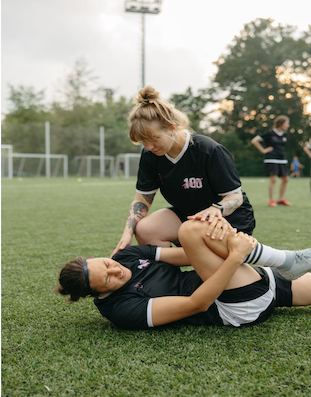7 prevention tips for sports injuries
Jun 01, 2023 01:39
Engaging in sports and physical activities is a great way to stay fit and enjoy a healthy lifestyle. However, the risk of sports injuries is always present. Whether you're an amateur athlete or a professional, taking preventive measures is essential to minimize the likelihood of injuries and ensure a safe and enjoyable sports experience. However, injuries are a common occurrence in sports, and taking preventive measures is crucial to ensure the well-being and longevity of athletes.

Whether you're a professional athlete or a recreational sports enthusiast, implementing effective prevention strategies can significantly reduce the risk of sports-related injuries and keep you performing at your best. You have to take care of yourself to avoid risks of elbow injury that is a recurrent hockey and tennis injury. It is recommended in case of injury to the elbow of quickly to ask a specialist to treat an albow tendinopathy.
Warm Up and Stretch
Before starting any physical activity, it's crucial to warm up your body and stretch your muscles. A proper warm-up increases blood flow, raises your body temperature, and prepares your muscles and joints for the upcoming activity. Incorporating dynamic stretches and mobility exercises specific to your sport can further enhance your performance and reduce the risk of muscle strains or tears.
Use Proper Protective Equipment
Wearing appropriate protective equipment is essential in preventing sports injuries. Whether it's a helmet, knee pads, shin guards, or mouthguards, using the right gear can significantly reduce the impact of falls, collisions, or direct blows. Make sure your protective equipment fits well, is in good condition, and is worn consistently during training sessions and competitions.
Maintain Proper Technique and Form
Learning and practicing proper technique and form is crucial for injury prevention. Whether you're lifting weights, running, or performing specific movements in your sport, using correct technique minimizes the strain on your muscles and joints. Consider working with a qualified coach or trainer who can provide guidance and help you refine your technique to prevent overuse injuries and unnecessary stress on your body.
Gradually Increase Intensity and Duration
Avoid sudden spikes in training intensity or duration, as they can lead to overuse injuries or muscle fatigue. Instead, focus on gradual progression in your workouts, allowing your body to adapt to increased demands over time. This approach reduces the risk of stress fractures, tendinopathies, and other repetitive strain injuries commonly associated with sports.
Cross-Train and Condition
Engaging in a variety of physical activities and cross-training can help prevent overuse injuries and improve overall fitness. Incorporate exercises that target different muscle groups, such as swimming, cycling, or yoga, to maintain a balanced and well-rounded fitness level. Additionally, including strength and conditioning exercises specific to your sport can enhance your performance and reduce the risk of injuries.
Listen to Your Body
Pay attention to your body's signals and listen to any warning signs of pain or discomfort. Pushing through pain can lead to further injury and setbacks. If you experience persistent or worsening pain, swelling, or limited range of motion, it's important to seek medical attention promptly. Early intervention and proper treatment, such as how to treat an elbow tendinopathy, can significantly improve recovery outcomes.
Rest and Recovery
Allowing your body adequate rest and recovery time is crucial for injury prevention. Rest days and scheduled recovery periods give your muscles and joints time to repair and regenerate. Incorporating proper sleep, hydration, and nutrition into your routine also plays a vital role in supporting your body's recovery process and reducing the risk of injuries.
Preventing sports injuries is a combination of proactive measures, proper training techniques, and understanding your body's limits. By following these X prevention tips, you can reduce the risk of injuries and maintain an active and healthy sports lifestyle. Remember, it's essential to prioritize your safety and well-being both on and off the field. Additionally, if you're dealing with an elbow tendinopathy or any sports-related injury, seeking professional guidance and understanding how to treat it effectively is crucial for a successful recovery.







































































